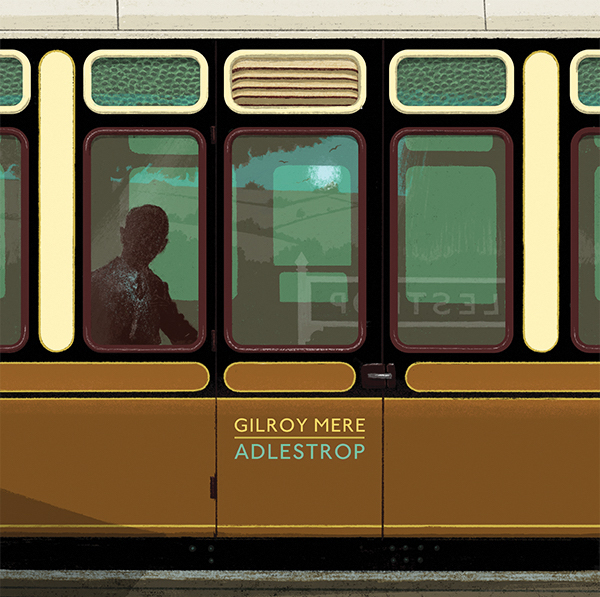Alistair Fitchett reviews Adlestrop — Gilroy Mere’s followup to the hugely popular The Green Line, out today on Clay Pipe Music.

Every day for the last fifteen years I have passed a boarded up, ivy-clad signal box that stands sentinel at the level crossing on the edge of the Devon village I call home. Built in the 18th Century, it is the last remaining signal box of the Bristol and Exeter Railway and when, in a few weeks’ time, it is lifted from its foundations and transported up country to a heritage railway in the Midlands, I will most certainly mourn its passing. Its ghostly absence will join that of the long-dismantled Exe Valley line which slips along the river’s edge just beyond the fields. I have walked its motherwort and yarrow bordered trackbed on too many occasions to count and each time I swear I smell engine steam lingering in the treetops.
I know I am not alone in being entranced by the loss of rural branch line railways and their stations. Take any random sample of middle-aged folks of A Certain Persuasion and I guarantee they will be more than willing to unload a bewildering torrent of information about railways past and present for your illumination and/or irritation. Beyond these gricer’s recitations of gauges, engine numbers and up/down platform placements however lies a fascination with landscape that has cycled through intense human intervention and back once more to be reclaimed by nature. The (often literal) lines, tracks and traces left on the landscape have become as much monuments to the past as Bronze Age barrows, their interrupted connectivity as real or imagined as Watkin’s Old Straight Tracks. When Beeching’s axe fell in the 1960s it may have erased vast segments of rural railway infrastructure, yet it also cleared the way for a network of memory, myth and mystery. Beeching’s map is England’s map, shifted in time and space to somewhere simultaneously out of touch yet peculiarly tangible and vibrating with the paradoxical presence of absence.
It is this presence/absence that Oliver Cherer, trading as Gilroy Mere, taps into with Adlestrop. The record’s starting point is Edward Thomas’ beguiling short poem of the same name, with Cherer, like many before and after, embarking on a pilgrimage to visit those station platforms where ‘No one left and no one came’. This line in particular has always resonated with me, touching as it does on the elusive pleasure of emptiness and extending, complicating and (literally) humanising the adage that ‘less is more’. The line has helped inform my personal view that our lives are made up of a myriad of looping trajectories, each leaping off from and being inexorably drawn back into a central nucleus whose raw energy is this essence of loss and absence. The essence may be melancholic, yet it has the strength to reset our psyches and send us, replenished, on new pathways of discovery. Gilroy Mere’s record is, like the poem that sparked its inspiration and which Cherer recites on the title track with a tender lightness, infused with that source of energy. It is a record that may thematically tread a similar path to 2017’s The Green Line (with railways rather than buses) or March’s Over The Tracks flexi release, but is subtly and crucially on its own loop. As with every other release on the flawless Clay Pipe Music label, it is the same but different. Comfortable in the itch of its skin.
In a similar vein to Darren Hayman’s adventurous and impressive Thankful Villages project, Adlestrop has taken shape through the careful collection and manipulation of field recordings made at numerous stations lost to Beeching’s cull. Some, like ones I regularly pass on walks and cycle rides in Devon lanes, have been turned to homes now marooned in fields; others little more than rubbled remnants of platform edges reclaimed by monkshood and columbine. Each have supplied their sounds and their own particular stories, which Cherer has assimilated and woven into his particular landscapes, inviting us to listen to the echoes left by myriad yesterdays with their magical wraiths; weaving melodies for the present, every pulse moulding new memorials for the future’s passing. Adlestrop is poetry and poetry is the canvas of magic and regret.
Adlestrop is horns and heartbeats, the shurning sigh of a feathery sea. It is ochre-toned arcs of electronic breaths and the gentle timbre of English oak; the divine rustle of bees and the paradisiacal birdsong of ‘all the birds of Oxfordshire and Gloucestershire’. Adlestrop is poetry and poetry is, like the inner and outer landscapes we tread and remake with each heartbeat, simultaneously everything and nothing at all.
*
‘Adlestrop’ is now available to stream and download. Vinyl copies sold out on pre-order, but the record is being repressed in GWR Brown and Cream livery (pictured), along with the ‘Over the Tracks’ flexi-disc EP. Sign up for updates here.
Visit Alistair Fitchett’s blog here. You can also follow him on Twitter and Instagram.